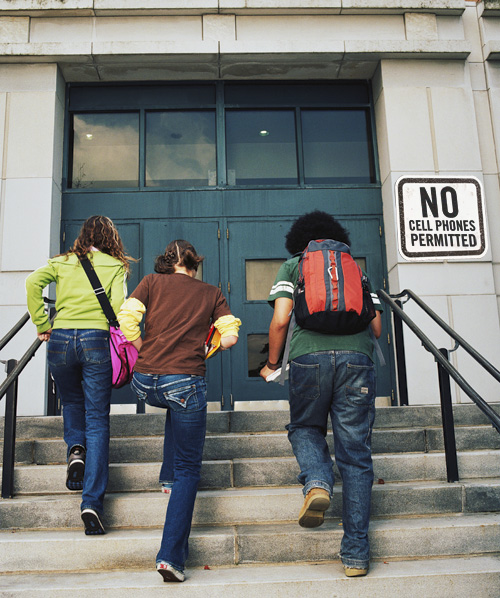 A new study from Harvard’s Berkman Center for Internet & Society examines how US tweens and teens are using technology in schools, and how they feel about those experiences.
A new study from Harvard’s Berkman Center for Internet & Society examines how US tweens and teens are using technology in schools, and how they feel about those experiences.
Although 78 percent of students own cell phones—47 percent of which are smartphones—students still face a wide variety of policies restricting mobile usage in schools, which students report as frustrating. Students also express frustration with schools’ limited WiFi access, problems with Internet filtering, privacy concerns as more and more schools aim to monitor students’ online activity, and some schools’ push to embrace tablet computers.
The study, Youth Perspectives on Tech in Schools: From Mobile Devices to Restrictions and Monitoring, reports the survey answers of 203 students ages 11 to 19 from across the greater Boston area, Chicago, Greensboro (North Carolina), Los Angeles, and Santa Barbara.
Researchers from the Berkman Center’s Youth and Media team queried the students on their use of mobile phones, laptops, and tablets in schools as well as their schools’ policies on such devices and their own reactions towards those policies. The interviews were conducted through 30 in-person focus groups as well as through questionnaires.
The goal of the study, the researchers say, is to explore how students are actually using technology as educational institutions adopt cloud computing technologies.
“In order to understand the implications of cloud services for student privacy more holistically, it might be helpful to examine how technology that is already implemented in academic contexts is used by youth and to explore how students feel about current practices,” the researchers say.
According to the survey, smartphone adoption among American students “has increased substantially and mobile access to the Internet is pervasive,” the researchers say. “One in four teens are ‘cell-mostly’ Internet users, who say they mostly go online using their phone and not using some other device such as a desktop or laptop computer.”
Some students are allowed to bring their phones to school, although access on these devices to popular websites and phone apps on the school’s WiFi connection may be restricted. Other students report that their schools’ Acceptable Use Policies require phones to be out of sight during the day, or that teachers collect phones at the beginning of the day. And some participants are “particularly frustrated” by their teachers’ reactions to what they perceived to be minor infractions of school mobile device policies.
Students also express frustration will schools’ wireless access and phone reception overall, even when such access was required for academic purposes.
Filtering policies remain another source of frustration. Even when using the Internet in an educational context, students can have their access to sites limited because, in order to receive certain federal funds, schools must comply with the Children’s Internet Protection Act (CIPA), which requires filtering measures. But sometimes these filtering and blocking methods even prevent access to appropriate content, which prevents or interferes with students’ completion of class assignments.
In addition, social media platforms—everything from Facebook to YouTube, Instagram, and Tumblr—are often blocked, which students find frustrating, even as they come up with their own workarounds. Some respondents even described examples in which their schools’ restrictions in accessing these sites actually interfered with the completion of their classwork.
Privacy is also an issue raised among students when it comes to Internet filtering. Researchers note that “several participants mentioned that they view these restrictions as a sign that their schools and teachers do not trust them, which leads youth to question their relationship with their teachers.”
Schools’ monitoring of students’ online activity is another privacy concern. According to the study, one common technique used on school computers is screen-surveillance software, which gives a supervising adult immediate access to a student’s screen with only subtle notification to the student. Tweens and teens are also concerned about school-created online resources where students can talk to each other—but which might allow school officials to monitor and even intercept communication. Even on independent social media sites such as Facebook, whether or not students and teachers connect there raises privacy issues, and could even violate school policies, the survey finds.
Meanwhile, according to the study’s participants, it appears that private schools are more open to having students bring their personal laptops to school than public and charter schools. That also raises the issue of the digital divide, with participants from less-privileged schools expressing envy that they only have outdated desktop computers for their academic pursuits.
However, some students whose schools are actively attempting to provide tablets express frustration at that technology, with several participants pointing out difficulties inherent to tablet devices, both in physical usage and digital access, when it comes to typing skill or connecting to particular sites.



Yes, there are frustrations and limitations for school internet access. However, this article could be balanced by adminstration amd teacjer frustration about student misuse of technolgy. For example, playing games on the cell phone while hiding in the bathroom, texting fellow students rather than paying attention in class, searching for pornography when the student is supposed to be doing academic research, As any teacher knows, the list is long.
Yes, there needs to be faster speed access, newer equipment and netwarks that can handle traffic from large numbers of users.